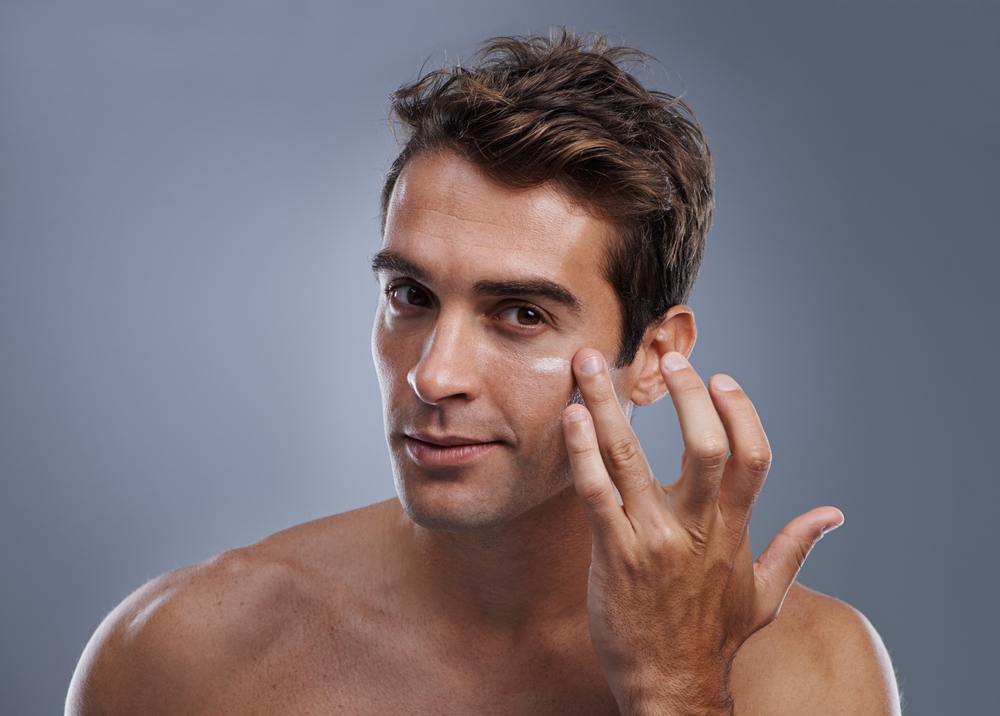The conversation around skincare often skews toward products and advice tailored for women, leaving men with limited guidance on addressing their unique needs. However, men’s skin differs significantly due to biological factors, lifestyle habits, and grooming routines. With telehealth platforms like OMNIA TeleHEALTH, men can now access expert dermatological advice tailored to their specific skincare challenges, all from the comfort of their homes.
The Biology Behind Men’s Skin
Men’s skin is biologically distinct from women’s in several ways, which influences its texture, resilience, and vulnerability:
- Thicker Skin: Male skin is about 20-25% thicker due to higher collagen density, making it less prone to fine lines but more susceptible to deeper wrinkles over time.
- Sebum Production: Men produce more sebum (oil), leading to a higher prevalence of acne and shiny skin.
- Hair Growth: Facial hair introduces challenges such as irritation, ingrown hairs, and razor burn.
- Slower Aging Process: Due to greater collagen retention, men’s skin often ages slower, but when wrinkles appear, they tend to be deeper.
Common Skincare Concerns Among Men
While everyone’s skin has unique characteristics, men frequently encounter the following issues:
- Acne and Oiliness
Excess sebum production often leads to clogged pores, blackheads, and acne breakouts, especially in younger men. - Razor Bumps and Ingrown Hairs
Shaving can irritate the skin, causing redness, bumps, or even infections in hair follicles. - Dry Skin
Despite higher oil production, many men experience dryness due to environmental factors, harsh cleansers, or insufficient hydration. - Signs of Aging
Wrinkles, hyperpigmentation, and sagging become concerns as collagen levels decline with age. - Sun Damage
Men are less likely to use sunscreen consistently, increasing the risk of premature aging and skin cancer.
Building a Skincare Routine for Men
A simple, effective skincare routine addresses common concerns and promotes healthy skin. Telehealth platforms like OMNIA TeleHEALTH allow men to customize routines based on their unique needs, guided by dermatology experts.
Essential Steps in Men’s Skincare
- Cleansing:
Use a gentle cleanser twice a day to remove dirt, oil, and impurities without stripping natural oils. - Exfoliation:
Exfoliate 2-3 times a week to prevent clogged pores and ingrown hairs. Opt for chemical exfoliants like salicylic acid for acne-prone skin. - Moisturizing:
Hydrate skin daily with a lightweight moisturizer to balance oil production and maintain a healthy barrier. - Sun Protection:
Apply a broad-spectrum sunscreen (SPF 30 or higher) every morning to prevent sun damage and reduce the risk of skin cancer. - Targeted Treatments:
For issues like acne, razor bumps, or aging, incorporate serums or creams with active ingredients like retinol, niacinamide, or hyaluronic acid.
Telehealth and Personalized Skincare for Men
One of the significant barriers for men in adopting skincare routines is the overwhelming number of products and lack of tailored advice. Telehealth services like OMNIA TeleHEALTH make it easier by providing:
- Expert Consultations: Virtual appointments with dermatologists who understand men’s specific needs.
- Customized Recommendations: Guidance on products and routines that match your skin type and lifestyle.
- Accessibility: No need for in-office visits, making it convenient for busy schedules.
Tips for Managing Specific Skin Concerns
Razor Bumps and Ingrown Hairs
- Use a single-blade razor or electric shaver to minimize irritation.
- Shave in the direction of hair growth and use a soothing aftershave balm.
Acne and Oil Control
- Incorporate salicylic acid or benzoyl peroxide treatments to manage breakouts.
- Use oil-free or non-comedogenic moisturizers and sunscreens.
Dry Skin
- Opt for cream-based cleansers and thicker moisturizers containing ceramides or glycerin.
- Avoid hot showers, which can strip natural oils from the skin.
Overcoming Misconceptions About Men’s Skincare
Despite growing awareness, some men hesitate to adopt skincare routines due to myths and stigmas.
- Myth: Skincare is too complicated.
Fact: A basic routine with three steps—cleanse, moisturize, and protect—can make a significant difference. - Myth: Skincare is unnecessary for men.
Fact: Skin health impacts overall confidence and prevents long-term issues like premature aging and skin cancer. - Myth: Men can use the same products as women.
Fact: Men’s skin requires formulations designed for thicker, oilier, and often more resilient skin.
The Role of Diet and Lifestyle
A holistic approach to skincare extends beyond products. Diet and lifestyle habits can significantly influence skin health.
- Hydration: Drinking sufficient water keeps skin hydrated from within.
- Balanced Diet: Incorporate foods rich in antioxidants, omega-3 fatty acids, and vitamins A, C, and E.
- Sleep and Stress Management: Poor sleep and high stress levels can exacerbate skin issues like acne and premature aging.
How OMNIA TeleHEALTH Simplifies Men’s Skincare
OMNIA TeleHEALTH empowers men to prioritize their skin health with tailored advice and convenient virtual care. Their telehealth services enable:
- Detailed skin evaluations to identify unique concerns.
- Expert guidance on selecting products and creating routines.
- Ongoing support through virtual follow-ups to track progress and adjust treatment plans.
Men’s skincare isn’t about trends; it’s about taking control of your health and appearance. Whether you’re dealing with acne, razor bumps, or aging concerns, the right care can make a world of difference. With telehealth solutions like OMNIA TeleHEALTH, you don’t have to navigate your skincare journey alone. Professional support is just a click away, offering you a path to healthier, more confident skin.
Sources
- Smith, R., & Thibault, A. (2016). Male-Specific Dermatology: Addressing Unique Skin Challenges. Journal of Clinical Dermatology.
- Kligman, A. M., & Christensen, M. S. (2010). The Biological Basis of Male Skin Aging. Dermatologic Therapy.
- Al-Niaimi, F., & Chiang, N. (2017). Men’s Skincare: A Growing Need for Dermatological Focus. Clinical and Experimental Dermatology.


